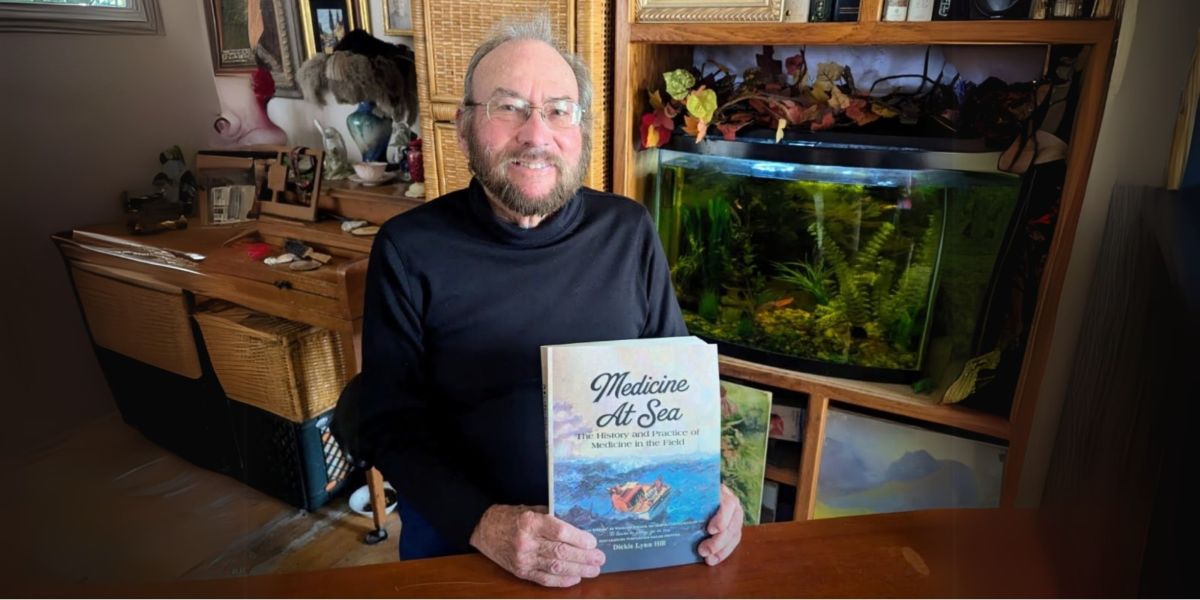By: Elowen Gray
The sea has always been a place of both opportunity and danger, where survival often depends on skill, preparation, and sometimes luck. While much has been written about maritime history, one of its often underexplored aspects is medical care aboard ships. In Medicine at Sea, Dickie Hill explores the long and sometimes challenging history of maritime medicine, offering a detailed look at how sailors, explorers, and medical professionals have managed illness and injury in some of the most remote places on Earth.
Hill, a U.S. Coast Guard-certified ship surgeon and former naval medical officer, presents an authoritative yet accessible account of how medicine has gradually evolved at sea. His book provides both historical perspective and practical knowledge, making it an engaging read for medical professionals, maritime workers, and history enthusiasts alike.
The book examines the difficult realities sailors have faced throughout history, showing how illness and injury often influenced the success or failure of entire expeditions. Hill explores significant turning points in maritime medicine, from the influence of the Crimean War on battlefield medical advancements to the role of ship surgeons in the Napoleonic era. He also discusses the resourcefulness required aboard whaling ships and naval vessels, where improvised medical solutions could mean the difference between survival and death.
In addition to its historical insights, Medicine at Sea provides a modern perspective on field medicine. Hill outlines emergency procedures, first aid techniques, and recommended practices for managing medical crises in isolated conditions. His expertise highlights how advancements in medicine have contributed to shaping healthcare delivery in maritime and other remote environments today.
What makes Medicine at Sea distinctive is Hill’s ability to connect past and present, showing how lessons from centuries of maritime medical practice continue to be relevant. As offshore industries grow and adventure travel becomes more frequent, the book underscores the importance of medical preparedness in environments where professional care is often not immediately accessible.
Hill’s writing is both informative and engaging, balancing detailed research with compelling storytelling. He brings history to life by recounting real-world shipboard medical emergencies, from amputations performed with makeshift tools to the first documented use of anesthesia on a naval vessel. His work honors the legacy of maritime medicine while equipping readers with valuable knowledge for their own journeys.
As the world continues to rely on seafaring industries and long-distance travel, Medicine at Sea remains a significant resource. Hill’s book is more than just a historical account—it is a practical guide for those who may find themselves facing a medical crisis in the middle of the ocean.
About the Author
Dickie Hill is an osteopathic physician, former lieutenant commander in the United States Navy Reserve, and a U.S. Coast Guard-licensed ship surgeon. With decades of experience in maritime and field medicine, Hill has dedicated his career to educating others on emergency medical care in remote and high-risk environments. His expertise and historical knowledge make Medicine at Sea a valuable contribution to the study of maritime healthcare.
Medicine at Sea: The History and Practice of Medicine in the Field (Third Edition) is available in both paperback and hardcover.
For more information or to inquire about purchasing copies, visit the listed channels below:
Instagram
Facebook
Official Website
Amazon
Barnes & Noble
Disclaimer: This article is intended for informational and educational purposes only and does not constitute medical advice. The historical and practical information presented here should not replace consultation with a qualified healthcare professional. Readers facing medical emergencies or health concerns should seek immediate professional assistance.


















